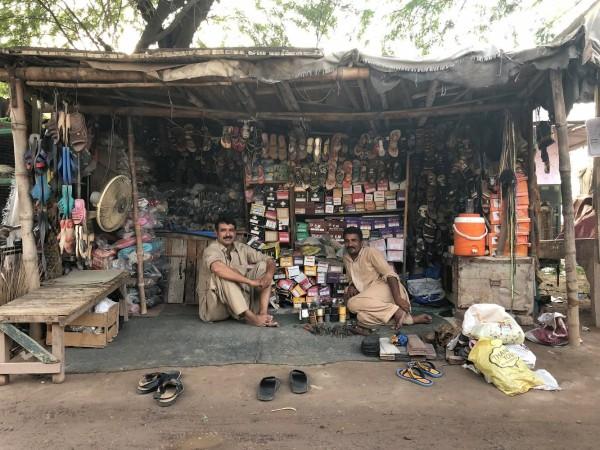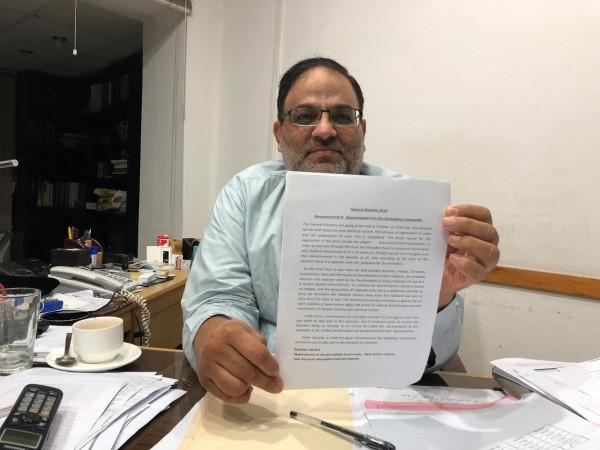
Pakistan's Dawn newspaper reported on Wednesday that the Ahmadiyya voters in the capital Islamabad were 'diverted' to separate polling booths. As Pakistan votes in the general elections 2018, the uneasy limelight is on the plight of this minority community, also known as Ahmadis.
The Ahmadis have been practically deprived of many citizen rights, most importantly the right to vote. They are proscribed form calling themselves Muslim though the community of around five million vouch for their devout Islamic faith and practices.
The alienation of the Ahmadis in Pakistan is also the story of Pakistan's democracy, or the absence of it. The plight of Ahmadis reflects the continuing regression in the quality of Pakistan's democracy and civil society over the last seven decades after independence.
Nothing puts this in stark contrast like the fact that the nation's first foreign minister was from this now reviled, de-franchised and ostracised community. When the first prime minister, Mohammad Ali Jinnah, made Chaudhry Zafrulah Khan the country's first external affairs minister, conditions were far different. That Pakistan doesn't exist anymore.
In today's Pakistan, the descendants of Chaudhry Zafrulah Khan have had to erase Islamic inscriptions even from his tombstone.
Who are Ahmadis?
The Ahmadis in Pakistan belong to an Islamic sect founded by Mirza Ghulam Ahmad. The Ahmadis consider him as a prophet. It's this claim that has made them the biggest official enemy of Islam in Pakistan. The official line in the Islamic Republic is that the Ahmadi faith is a blasphemy. If Ahmadis want to get a passport they have to denounce their faith and go under oath against allegiance to Mirza Ghulam Ahmad.
If they want to vote in elections, they have to either renounce their faith or enrol themselves as "non-Muslim." Most Ahmadis won't denounce their faith and hence they choose to abstain from voting. If Ahmadis actually register as non-Muslims, they are asked to vote in separate booths.
How are Ahmadis discriminated against?
Apart from the lack of civic rights, the denial of basic religious freedom is at the root of the Ahmadi persecution. They can't profess their religion publicly and they are banned from building mosques. The Ahmadis can't even make the call for Muslim prayer.
Their faith bars them from being represented in the lawmaking bodies. The Catch-22 situation of the Ahmadis is most evident in the way they are prevented from performing the Haj. If they have to get a passport they have to denounce their faith and sign a declaration that says: "I consider Mirza Ghulam Ahmad Qadiani to be an imposter nabi and also consider his followers ... to be Non-Muslims."
The other way to get a passport is to apply for it as a non-Muslim. But, the catch here is that if you are a non-Muslim you can't travel to Mecca to perform the Haj.

Ahmadi persecution - Timeline
The persecution of the Ahmadis dates back to the anti-Ahmadiyya riots that broke out in 1953. The minority community was on the back foot for the next 20 years but their fortunes worsened again in 1974 when Pakistan amended the constitution to defined the term "Muslim". In the list that was released in the aftermath, Ahmadis were categorised as non-Muslim under Pakistani law.
Deprived of their religious identity, the noose around Ahmadis tightened with each passing year. In 1984, President Zia-ul-Haq amended the penal code that made Ahmadis extremely vulnerable. They could now be sentenced to death at will on blasphemy charges. Every year Ahmadis are charged with blasphemy.
The Zia era law states that the prophethood of Mirza Ghulam Ahmad is something that "defiles the name of Prophet Muhammad" and hence directly blasphemous.
"Ahmadis thus could no longer profess their faith, either orally or in writing. Pakistani police destroyed Ahmadi translations of and commentaries on the Quran. They banned Ahmadi publications, as well as using any Islamic terminology on Ahmadi wedding invitations, offering Ahmadi funeral prayers, or displaying the Kalima – the statement that "there is no god but Allah, Muhammad is Allah's prophet," the principal creed of Muslims – on Ahmadi gravestones," Human Rights Watch says in a report.














